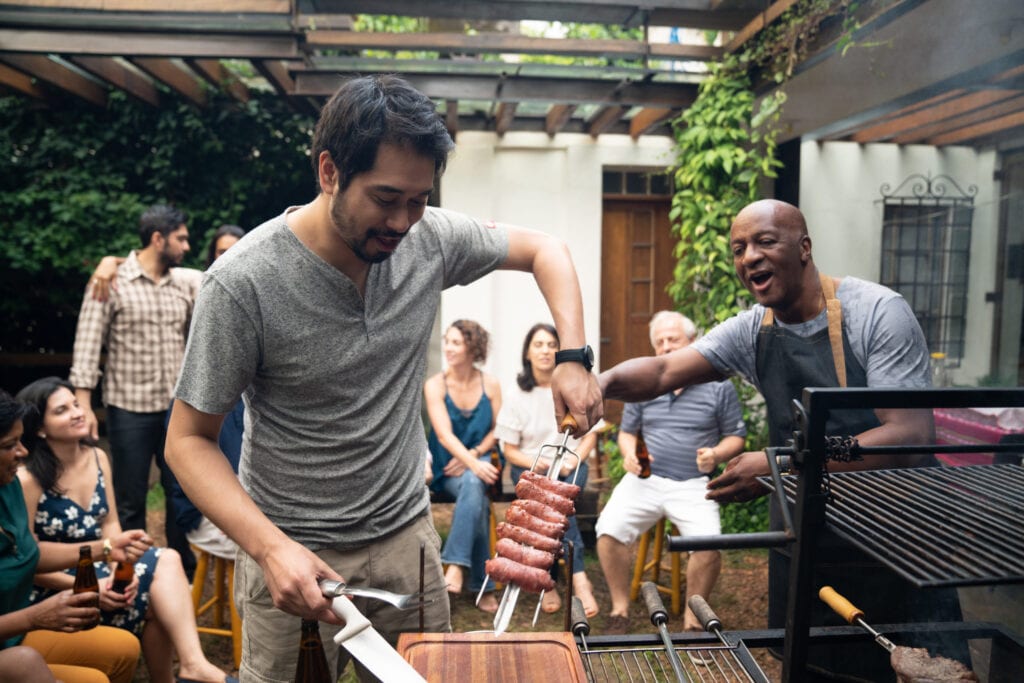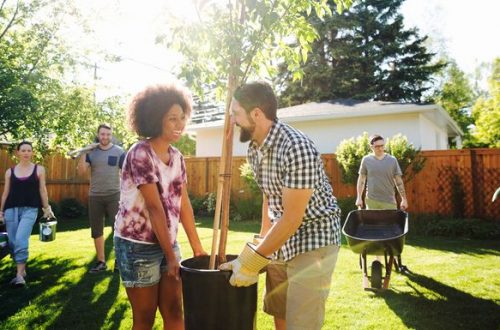
Practices to be actively anti-racist on a daily basis
Practices to be actively anti-racist on a daily basis
 We live and work in institutions that were built on the backs of people of color being oppressed. These institutions may affect us every day in ways we don’t even realize, like the lack of diversity in leadership positions at work or how other races are portrayed in pop culture and the media. If you live in a racist society, it’s not enough to not be a racist; if you do nothing, racism will keep going around and around. We need to be anti-racist because we live and work in racist systems. This means that both white people and Non-Black People of Color need to learn how to be anti-racist.
We live and work in institutions that were built on the backs of people of color being oppressed. These institutions may affect us every day in ways we don’t even realize, like the lack of diversity in leadership positions at work or how other races are portrayed in pop culture and the media. If you live in a racist society, it’s not enough to not be a racist; if you do nothing, racism will keep going around and around. We need to be anti-racist because we live and work in racist systems. This means that both white people and Non-Black People of Color need to learn how to be anti-racist.
If you thought that killing George Floyd was wrong, you should say so. Those who said they were committed to learning about racism, I want to remind you to speak up every day, not just when something like the video goes viral or is trending on social media. Racism in our country is complicated and shows up in a lot of different ways, so we need to work against it.
Practices to be actively anti-racist on a daily basis
Here are a few ways you can work against racism every day.
1. Use content created by Black people
Most likely, you didn’t learn the whole story in your U.S. history classes. Our curriculum is biased and gives a false story, and the voices of people of color are often left out. Think for a moment: from whose point of view do you think the stories in our U.S. history books were written?
We need to learn more by reading works from people whose voices were left out of the story we were told. Read books and articles by Black authors like Ibram X. Kendi, Michelle Alexander, Elaine Welteroth, the former editor-in-chief of Teen Vogue, and Maya Angelou. Listen to podcasts like Code Switch on NPR and Intersectionality Matters! by Kimberlé Crenshaw, and watch movies and TV shows made by Black people. The Hate U Give and 13th are both on Netflix, and Just Mercy is free on Amazon Prime until June. Put these on your list of things to read and watch.
2. Think about your own prejudices
Take a step back and think about your own prejudices. We all hear and believe what the world tells us, and we’ve been taught to see different groups of people in different ways.
Checking your own biases is easy with tools like Harvard’s Implicit Bias Test and The New York Times’ “How Much Racism Do You Face Every Day?” You can also find a lot of books that can help you understand your privilege and the Black experience. The first step to becoming truly anti-racist is to start with yourself and see where you fall short.
3. Tell your family what you think.
Since older generations (and sometimes younger ones) may have different ideas about politics and social issues, you may have relatives who are openly racist behind closed doors. The next time one of your relatives makes a casual racist comment at the dinner table, speak up.
When you speak up, ask questions instead of making statements so that no one gets defensive or feels attacked. Ask them why they feel that way, and keep asking until they give you an answer that shows it’s probably racism. Use “I” statements instead of “you” statements (I learned that…) to show that they are welcome to learn from you. When your family gets together for a holiday, it might be helpful to hear tips on how to talk to them about social and political issues. Don’t just speak up when everyone agrees with you; speak up when they don’t, because that’s when we learn to understand. If people don’t talk to each other, there won’t be any real progress.
4. Speak up in your group of friends
I have been quiet when I should have spoken up. I didn’t want to be that person of color who made everyone feel weird all of a sudden. I was afraid that my friend would say that they didn’t mean what they said, even though I knew in my heart that they were wrong. I’m guilty of being quiet and, by not saying anything, giving my approval.
I’ve noticed that people talk about people of color when there aren’t as many of them around. If you hear or see something hurtful that makes people of color seem less important, please say something.
5. Don’t appropriate Black culture
Some of my white friends like rap music, but when one of them says that a black female artist is too “ghetto,” they get mad. Nope. That’s not true. It hurts and is wrong.
Appropriation is when someone takes a part of another culture for their own use. It is taken when it is good for them and easy to do so. In the scenario above, my friend liked rap music and would rap the lyrics to his favorite songs, but he didn’t like the artists who were part of the culture he was using to his own advantage. You need to accept and value the culture as a whole and give credit, acknowledge, and respect where it came from.
Activities for kids and young adults that will help you keep an anti-racist home
6. Be heard at work
What’s the situation at work like? Does your company talk openly about diversity, fairness, and being open to everyone? Do they talk about it, and can you tell that they try to make everyone feel like they belong? What does the diversity of your team look like? What does your leadership look like? Do they talk about these things that are happening now?
Check to see if your ways of hiring people are fair. Reach out to your HR department and ask about how people are hired, as well as talk about any worries you may have. I’ve found that finding coworkers who share the same goal of making the workplace more welcoming can lighten the load, give a push, and speed up the pace of change. If you have employee resource groups or people in positions related to diversity, equity, and inclusion, talk to them.
We can’t act like nothing is going on in the rest of the world when we’re at work. It is very important for leaders to say that they are against police brutality, that they will be there for the Black community, and that they will be part of the change. It’s been a rough few weeks and months, so if you work on a diverse team, think about what your coworkers are going through. We need to be there for each other and help each other out.
7. Vote
It’s important to vote for people who will fight against these wrongs. Sure, you should vote in the primaries and the presidential election. But it’s also important to vote in local and state elections to make sure that police reform is fair and just. The elected officials who help run our criminal justice system are the mayors, county executives, sheriffs, judges, and district attorneys.
You can find out ahead of time about important election dates and the people on your ballot. I’ve also used the voter guides made by the League of Women Voters for my city to find out more about the candidates and learn more about them.
Also, if you can, you should give money to campaigns. Money and influential lobbyists have a big impact on campaigns—they can even decide who makes it to the general election. People need to get more involved in campaigns and give money to candidates so that they have a better chance of winning against those backed by lobbyists.
8. Do your regular work
This is easy to forget. If you have privilege, it’s easier to stay in your own world, and that’s why these wrongs keep happening. We can’t just fight against wrongdoing when it’s popular on social media or when we’re with people who agree with us. Remember this moment when the news and media move on and keep doing this work. We all have to be a part of the change for it to work.
Download the hobbytwin app and tell a friend for instant hobby matching:
For iPhone/iPad&iPod:









